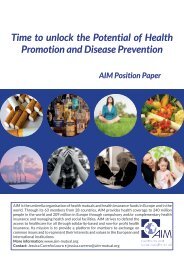Exploring patient participation in reducing health-care-related safety risks
Exploring patient participation in reducing health-care-related safety risks
Exploring patient participation in reducing health-care-related safety risks
You also want an ePaper? Increase the reach of your titles
YUMPU automatically turns print PDFs into web optimized ePapers that Google loves.
Patient <strong>participation</strong> <strong>in</strong> elective surgery <strong>safety</strong> <strong>in</strong> Portugal<br />
The report published on 28 March 2011 by the Unidade Central de Gestão de Inscritos<br />
para Cirurgia [Central Unit of the Surgical Wait<strong>in</strong>g List] states that the annual volume<br />
of surgery <strong>in</strong> Portugal <strong>in</strong>creased by 37.6% between 2006 (345 321 episodes) and 2010<br />
(475 293) (12,13). These official data only relate to <strong>patient</strong>s undergo<strong>in</strong>g elective 28 or<br />
deferred 29 surgery (13−15).<br />
National evidence concern<strong>in</strong>g the quality and <strong>safety</strong> of services <strong>in</strong> Portugal is lack<strong>in</strong>g,<br />
and <strong>in</strong>formation about adverse events is currently very limited and difficult to access<br />
(16). Fragata, however, believes that about 48% of all adverse events occur <strong>in</strong> operat<strong>in</strong>g<br />
theatres and that 30–50% of cases are assumed to be preventable (17).<br />
A Portuguese study from 2008 (18) reported that 2.5% (n=41 191) of procedures<br />
performed <strong>in</strong> Portuguese hospitals 30 could be l<strong>in</strong>ked to one or more episodes of adverse<br />
events. The authors of the study expected the average length of stay to be 11 days longer<br />
for <strong>in</strong>dividuals harmed by adverse events dur<strong>in</strong>g medical or surgical procedures than<br />
those not affected by adverse events.<br />
Accord<strong>in</strong>g to the ECDC, Portugal reported 4201 SSIs <strong>in</strong> 2008. Of <strong>patient</strong>s stay<strong>in</strong>g<br />
more than 48 hours <strong>in</strong> the ICU, 391 acquired pneumonia, with the most frequently<br />
isolated microorganisms be<strong>in</strong>g Pseudomonas aerug<strong>in</strong>osa (23.5%) followed by<br />
Staphylococcus aureus (17.6%). Two hundred and n<strong>in</strong>e cases of ICU-acquired BSI were<br />
also reported: the most frequently isolated microorganism was coagulase-negative<br />
staphylococci (23.9%) (19).<br />
Another study of adverse events was carried out by the National School of Public<br />
Health at three hospitals <strong>in</strong> Lisbon <strong>in</strong> 2009. The <strong>in</strong>cidence of adverse events was 11.1%,<br />
of which 53.2% were considered preventable. Just over 60% did not harm the <strong>patient</strong>s or<br />
resulted <strong>in</strong> m<strong>in</strong>imal impairment, but 10.8% resulted <strong>in</strong> death. The average length of stay<br />
was 10.7 days longer for <strong>patient</strong>s who experienced an adverse event (20).<br />
The 2009 national survey on prevalence of <strong>in</strong>fection carried out by the National<br />
Infection Control Programme <strong>in</strong> 144 hospitals showed an HAI prevalence of 9.8%<br />
and a community-acquired <strong>in</strong>fection prevalence of 20.3% among <strong>in</strong><strong>patient</strong>s. The most<br />
frequently isolated microorganisms were MRSA, Escherichia coli and Pseudomonas<br />
aerug<strong>in</strong>osa (21). P<strong>in</strong>a and colleagues believe that 5 <strong>in</strong> 100 <strong>in</strong><strong>patient</strong>s may have acquired<br />
an HAI (22).<br />
In 2009, Portugal was one of 19 countries apply<strong>in</strong>g <strong>patient</strong> <strong>safety</strong> <strong>in</strong>dicator rates from<br />
the set of 7 <strong>in</strong>dicators 31 selected by the OECD’s Patient Safety Expert Subgroup. From<br />
28 The “lista de <strong>in</strong>scritos para cirurgia” [wait<strong>in</strong>g list for surgery] (13,14) does not <strong>in</strong>clude: <strong>patient</strong>s undergo<strong>in</strong>g m<strong>in</strong>or surgery,<br />
unless general or loco-regional anaesthesia and the use of an operat<strong>in</strong>g theatre are necessary; <strong>patient</strong>s undergo<strong>in</strong>g surgery<br />
outside of the ambulatory or conventional surgery room; and <strong>patient</strong>s undergo<strong>in</strong>g urgent surgery (not scheduled) <strong>in</strong> the<br />
emergency operat<strong>in</strong>g theatre (13).<br />
29 Deferred urgency is “[W]hen the <strong>patient</strong> <strong>in</strong> an acute crisis situation is offered surgery, deferred <strong>in</strong> time, us<strong>in</strong>g elective surgery<br />
resources” [translated from Portuguese] (14).<br />
30 Accord<strong>in</strong>g to adm<strong>in</strong>istrative data from the reimbursement system based on diagnosis-<strong>related</strong> groups.<br />
31 Based on hospital adm<strong>in</strong>istrative databases (most of the participat<strong>in</strong>g countries use a reimbursement system based on<br />
diagnosis-<strong>related</strong> groups).<br />
95



